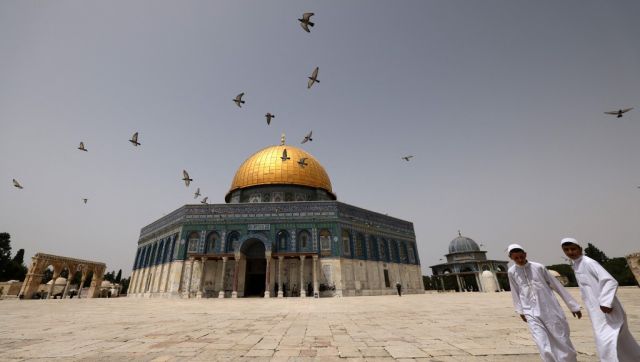Before Benjamin Netanyahu took power in Israel, many expressed concern about some of his right-wing allies in the government, particularly how they would deal with the Palestinians. Now, at least one of those concerns has been proven correct. On Tuesday, National Security Minister Itamar Ben-Gvir entered the al-Aqsa mosque, a move seen as a deliberate provocation by the Palestinians. Let’s take a closer look: Why is the al-Aqsa mosque important? The al-Aqsa mosque is in a 35-acre compound. The compound comprises the Dome of the Rock, the four minarets, the compound’s historic gates, and the mosque itself. The al-Aqsa mosque is important to Jews, Christians and Muslims alike. Lying within Israeli-controlled east Jerusalem, the compound is administered by Jordan’s Waqf Islamic affairs council, with Israeli forces operating there and controlling access.
It is the most sacred site for the Jews, who refer to the compound as the Temple Mount.
The compound is Islam’s third holiest site after Mecca and Medina and Judaism’s most sacred site, a vestige of two ancient temples of the faith. The Muslims call it al-Haram al-Sharif, or the Noble Sanctuary. Under a historic status quo, non-Muslims can visit the site at specific times but are not allowed to pray there. But in recent years a growing number of Jews, mostly Israeli nationalists, have covertly prayed on the compound, a development decried by Palestinians. The site has witnessed frequent violence between Palestinians and Israeli police most recently in April during Ramadan when thousands gathered for prayers. More than 150 Palestinians were wounded after Palestinians threw rocks and Israeli police fired stun grenades in what was the most serious violence at the site in nearly a year. Ben-Gvir and al-Aqsa Ben-Gvir launched his ministerial career on 29 December, as part of Israel’s most right-wing government in history led by Netanyahu. While Ben-Gvir has visited the compound numerous times since entering parliament in April 2021, his presence as a top minister is highly significant – as it could lead to violence. Hamas rules the Gaza Strip and in May 2021 an 11-day war broke out in the territory between Palestinian militants and Israel, after violence at Al-Aqsa mosque. Hundreds of Palestinians and dozens of Israeli police officers were wounded in the preceding clashes across east Jerusalem, initially sparked by restrictions on Palestinians gathering and possible evictions of residents. During this period Ben-Gvir rallied his supporters at Israeli settler homes in east Jerusalem, which has been occupied by Israel since the 1967 Six-Day War. [caption id=“attachment_11864521” align=“alignnone” width=“640”] Itamar Ben-Gvir leader of the far-right Otzma Yehudit (Jewish Power) party. AFP[/caption] A controversial visit in 2000 by then Opposition leader Ariel Sharon was one of the main triggers for the second Palestinian intifada, or uprising, which lasted until 2005. Some had expressed concern about
Ben-Gvir given his history of advocating violence against the Palestinians. Ben-Gvir has advocated for Arab-Israelis deemed disloyal to the state to be expelled and for the annexation of the occupied West Bank. Until a few years ago he had a portrait in his living room of Baruch Goldstein, who massacred 29 Palestinian worshippers at a Hebron mosque in 1994. Ben-Gvir says he wants to end Palestinian autonomy in parts of the occupied West Bank and maintain Israel’s occupation over the Palestinians, now in its 56th year, indefinitely. The far-right minister also recently brandished a pistol while visiting a tense Palestinian neighbourhood in east Jerusalem. Netanyahu in an interview with NPR had defended Ben-Gvir, saying he has “modified a lot of his views since then” and “with power comes responsibility.” Regardless, Ben-Gvir has lobbied to overhaul management of the site to allow Jewish prayer there, a move opposed by mainstream rabbinical authorities. Waqf guards told AFP that Ben-Gvir was accompanied by units of the Israeli security forces, while a drone hovered above the holy site. After he left the site on Tuesday morning, visitors arrived at the plaza and the situation remained quiet. Ben-Gvir after visit the site tweeted that it is “is open to everyone and if Hamas thinks that if it threatens me it will deter me, it should understand that times have changed.” MiddleEastEye.com quoted Ben Gvir as saying, “Our government will not surrender to threats from Hamas.”
“The Temple Mount is the most important place for the people of Israel.”
“We maintain the freedom of movement for Muslims and Christians, but Jews also go up to the site, and those who make threats must be dealt with an iron fist.” Hamas’ rival Fatah in a statement said Israeli Prime Minister Benjamin Netanyahu was “responsible for Ben-Gvir’s storming of Al-Aqsa and its consequences”. It added that it “strongly condemns the extremist minister Ben-Gvir’s storming of the blessed Al-Aqsa Mosque and considers it an unprecedented provocation and a serious threat” to regional stability. How did Hamas react? Hamas spokesman Hazem Qassem said that Ben-Gvir entering the site on Tuesday was “a continuation of the Zionist’s occupation aggression on our sacred places and war on our Arab identity.” “Our Palestinian people will continue defending their holy places and Al-Aqsa mosque,” he said. Qassem also called it a a “crime” and vowed the site “will remain Palestinian, Arab, Islamic”. Ahead of Ben-Gvir’s visit, top Palestinian official Hussein Al Sheikh on Monday said it would be a “blatant and shameless provocation which requires a Palestinian, Arab and international response”. Basem Naim, a senior Hamas official, last week warned such a step would be “a big red line and it will lead to an explosion”. How has the world responded? Not well. The US Embassy in Jerusalem said that Ambassador Thomas Nides “has been very clear in conversations with the Israeli government on the issue of preserving the status quo in Jerusalem’s holy sites. Actions that prevent that are unacceptable.” ArabNews.com quoted the Organization of Islamic Cooperation (OIC) as strongly condemning the visit “as part of Israel’s attempts to change the existing historical and legal status of the blessed Al-Aqsa Mosque.”
The OIC said it was “a provocation to the feelings of all Muslims and a flagrant violation relevant international resolutions.”
The United Arab Emirates, which diplomatically recognised Israel in 2020, “strongly condemned the storming of Al-Aqsa Mosque courtyard by an Israeli minister under the protection of Israeli forces.” A Foreign Ministry statement urged Israel to “halt serious and provocative violations taking place there.” The ministry also “called upon Israeli authorities to assume responsibility for reducing escalation and instability in the region.” Bahrain, which also recognised Israel at the same time, did not immediately acknowledge the incident. A separate statement from Saudi Arabia’s Foreign Ministry also condemned the Israeli minister’s action, as did statements from Kuwait and Qatar, all of which don’t diplomatically recognise Israel over its occupation of lands sought by Palestinians for a future state. Turkey, which has recently been working toward normalising its strained ties with Israel, condemned what it said was “the provocative action” by the Israeli national security minister. “We call on Israel to act responsibly to prevent such provocations that would violate the status and sanctity of religious sites in Jerusalem and cause an escalation in the region,” the Turkish Foreign Ministry said. The Hashemite Kingdom of Jordan, which acts as custodian of the contested shrine, condemned Ben-Gvir’s visit “in the strongest terms.” Egypt warned against “negative repercussions of such measures on security and stability in the occupied territories and the region, and on the future of the peace process.” With inputs from agencies Read all the Latest News, Trending News, Cricket News, Bollywood News, India News and Entertainment News here. Follow us on Facebook, Twitter and Instagram.


)
)
)
)
)
)
)
)
)



